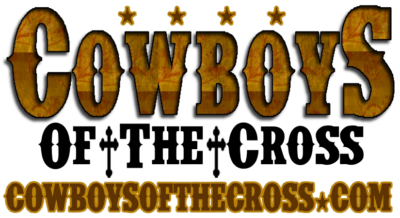
by admin | Apr 18, 2022 | The Company You Keep
Part 1 of 7 The Company You Keep
By Scott Hilgendorff / Cowboys of the Cross
Working in rodeo, when cowboys or bull riders share advice, it’s often focused on how to be more successful at the sport. A common piece of advice I’ve seen shared among the cowboy crowd is about just that—the crowd you’re in. They advise to spend more time with better, more successful competitors otherwise you risk being brought down by others.
The Bible has something to say about that as well when it comes to growing in our faith.
2 Corinthians 6:14 Do not be unequally yoked with unbelievers. For what partnership has righteousness with lawlessness? Or what fellowship has light with darkness?
Despite being written about 2,000 years ago, this is an illustration that should be easy to understand for cowboys, whether on the rodeo or ranch side of the industries.
What happens when an ox or team of horses is yoked together but one is not as well equipped, well trained or strong as the other?
The team can’t work as a team. The stronger horse is having to pull harder. The horse working harder is going to wear down. The horse working harder is going to be held back.
Sure, there are always exceptions, but when it comes to dating, it is common to hear a Christian think he or she can maintain a healthy relationship with a non-believer. The Christian thinks he or she will win that person over to Christ and will justify staying in the relationship. He or she might even get the person to study the Bible with them a little and at the start, will get asked lots of questions. That will encourage the Christian to push harder, even seeing it as ministry or what God would have them do.
The intentions are good for sure.
As the relationship heats up, the Christian compromises and moves in. I mean, even more time together means an even bigger chance to win the person over for Jesus, right?
But after that initial bit of interest, what typically happens is, the non-believer begins to fight against the changes the Christian hopes to bring about. As they begin living more daily life together, the Christian ends up sleeping in Sunday mornings with the non-believer because it’s easier than fighting to get the other to go to church. The Bible study stops as they get busier living life but soon the Christian wears down and instead of the non-believer digging into a Bible he or she never had any interest in, the Christian begins reading his or her Bible less, praying less, spending less time thinking about life from a Christian perspective as they become a couple.
The Christian wears down and is no longer the force for Jesus that he or she was. His or her light dims.
Being unequally rarely works and the ox will sooner or later stumble and fall and be taken down by the weaker ox.

by admin | Apr 5, 2022 | Behind the Bucking Chutes
By Scott Hilgendorff / Cowboys of the Cross
Be Strong.
Weakness is not having the strength to do something. Meekness is having the strength and power but holding it back. Do not confuse meekness for weakness.
We all have power over someone. A parent has power over a child, a trainer in the arena with a whip has power over a horse, a rodeo judge has power over the contestant.
Matthew 5:5 Blessed are the meek, for they shall inherit the earth
Sounds like Jesus is telling us there’s a lot to be gained by holding back, even when it feels justified.
If we have strength over others, we can abuse that strength by taking more, living excessively, intimidating others or being abusive while putting our needs above others. Strength can lead to selfishness when it isn’t controlled.
The ideas Jesus was sharing in his Sermon on the Mount are challenging to the cowboy community. We’ve looked at how Jesus tells us to turn the other cheek to stop us from pursuing vengeance and giving us an opportunity instead to show others the power of forgiveness. That can become an illustration that can lead others to wanting to know about why we walked away from a situation and lead to a discussion about our saving faith in Jesus.
That’s why it is important to understand that choosing to turn the other cheek can be a sign of meekness that has absolutely nothing to do with being weak.
A person of great strength has the power to intimidate or abuse others but think about how much better a leader is if, instead of abusing that power, they treat someone with kindness and gentleness. By keeping strength under control, well, that takes even more strength than lashing out.
John 18:10-11 Then Simon Peter, who had a sword, drew it and struck the high priest’s servant, cutting off his right ear. (The servant’s name was Malchus.)
11 Jesus commanded Peter, “Put your sword away! Shall I not drink the cup the Father has given me?”
Peter lashed out when guards came to take Jesus away and Jesus commands Peter to put the sword away. While we know God’s plan for salvation was meant to unfold and Jesus would soon die for us on the Cross, Peter didn’t and his rash response, strength over that priest, would potentially have interfered with the need for Jesus to be arrested, tried and sacrificed for us on the cross.
Our self-control, or meekness, can set an example people are not expecting the way our culture normally handles situations and can lead to important discussions about salvation by showing a Christ-like response to others. That offers a great inheritance of eternal life in Heaven to others.
Does it bring God glory to use your power to lash out or does it bring Him glory for others to know you could have made hamburger out of a guy’s face, that he had it coming, but you held back your anger and spared him. That shows Jesus to the guy and opens the door to talk about salvation. THAT is something we’re all commanded to do but few of us ever do.
It can be hard for a cowboy, bull rider or outlaw to accept this but again, meekness is having real power but keeping it under control. Holding back takes more strength than letting loose. Be strong.

by admin | Mar 10, 2022 | Behind the Bucking Chutes
By Scott Hilgendorff / Cowboys of the Cross
Most would say the opposite of war is peace. Peace in many Biblical contexts is something much different.
As we learn more about our faith in Jesus Christ, it can lead us to pursue ways to avoid causing conflict, to find ways to reconcile with others and it can lead some to a firm belief in pacifism when it comes to war.
War is something that has been on our minds a lot lately as we watch the news unfold in Ukraine and our allied countries, at the writing of this, work to avoid being drawn into a full-blown war with Russia.
It’s a good time to talk about peace, but this is the kind of peace that helps us to not feel worry about escalating conflicts. It is a kind of peace that helps us to be okay when the truck breaks down, cattle prices bottom out and a member of our family has chosen this week to pick a fight over who gets dad’s piece of hunting property in the will.
John 14:27 Peace I leave with you; my peace I give to you. Not as the world gives do I give to you. Let not your hearts be troubled, neither let them be afraid.
John 16:33 I have said these things to you, that in me you may have peace. In the world you will have tribulation. But take heart; I have overcome the world.
Both verses were part of Jesus’s words to his disciples as he was preparing them for his death on the cross. The disciples still didn’t understand and thought Jesus was meant to take over rule from the Romans.
While the Bible stresses in both the Old and New Testament not to feel worry, in these verses, Jesus is offering us a peace that is more profound than how we understand the word in English. In this context, Jesus is offering us more than just an absence of conflict and strife, but in a way, a kind of blessing for us through a stronger peace that comes from our saving faith in him and our assurance of an eternity in Heaven.
It would be much better as individuals to not to be in conflict with one another over personal disputes or to be feeling stress and worry over personal struggles at a job. It would be better as nations for us not to be at war with one another over our borders. But Jesus is offering us a peace that lets us exist in the middle of these conflicts with a sense of hope for what comes after.
When we understand that through our belief in his life here as the Son of God and his death on the cross and resurrection and that through repentance and asking to be forgiven for our sins, we can be sparred God’s punishment of our sin, then we can feel the peace that Jesus is offering. That peace is knowing a perfect eternity is waiting for us where there isn’t conflict and sin.

by admin | Feb 24, 2022 | Strengthening Your Grip
By Jesse Horton / Cowboys of the Cross
I find myself in awe moment by moment as I contemplate the consistent love of God. In fact, because God is immutable (he does not change; Malachi 3:6), in everything we know to be an attribute of God he is consistent. He is consistent because attributes, unlike characteristics or qualities, tell us who God is – not how he behaves (for instance, “God is love,” 1 John 4:8,16). Neither the passing of time, the changing of circumstances, nor our own back and forth responses to God change him in any way; God is who he is apart from any outside influence…otherwise, he would not be God.
And the Apostle John was absolutely correct – God is love! In fact, if we accept that Jesus Christ is the fullest revelation of God (Col. 2:9; Heb. 1:1-3), then the way Jesus reveals God to us is of the utmost importance. And how did Jesus reveal God? As the loving Father! Jesus frequently referred to God as his Father, but he also encouraged his disciples to pray to our Father; that means as God is to Jesus, so he can be to his followers!
Many attempt to explain God primarily as the Creator, Ruler, and Sustainer of the universe, and indeed, he is! However, Jesus revealed God first and foremost as our loving Father! “Father, I desire that they also, whom you have given me, may be with me where I am, to see my glory that you have given me because you loved me before the foundation of the world” (John 17:24, emphasis mine). Before God ever created, he was the eternal, immutable Father loving his Son. So much theology hangs on this fact. In fact, I’d say this needs to be the bedrock foundation for how you understand God – He is the eternal loving Father. To be eternally a Father means God has always had a Son, and so that Son must also be eternal, and if eternal, then also God! And since God is spirit, he gives all that he has to his Son; anointing the Son with his Holy Spirit is how the Father loves his Son. And if the Father’s love for his Son is eternal (and it is since the Father didn’t begin to love the Son but has always loved the Son), then the mode of that love (which is prior to any creative act) is also God; “God is love”!
Some of us in the cowboy culture didn’t grow up with the best fathers and it can make it hard to understand the full depth of what all of this means. It means something great for all of, us even if we were raised with the best father imaginable.
So, when we begin our understanding of God with the foundational attribute that God is a loving Father, all other Christian teaching can fit neatly together without contradiction and without downplaying God as some inwardly-focused sovereign who demands the obedience of his subjects. Above, we explained the reason God is Trinity. We can explain why a loving Father would create and give life to something other than himself. We can understand the mercy of a loving and holy Father on his wayward children. We can understand why the loving Father’s wrath against sin is severe because sin hurts his children and separates them from his love. We can even understand why a just and loving Father would separate rebellious, sinful children from the children whose desire is to live in submission to his kingdom.
God loves you, and if you are in Christ, he loves you with the same love Jesus has experienced for all of eternity. How wonderful! How beautiful! How amazing that the God who is all in all has set his affection on us! How can your heart not leap inside your chest at this great and wonderful truth!
Won’t you praise him with me today for his unspeakable love toward us? Won’t you join me in bringing the loving rule and reign of his Fatherly kingdom to our neighbors and to the earth? Hallelujah! God is love!

by admin | Feb 24, 2022 | Behind the Bucking Chutes
By Scott Hilgendorff / Cowboys of the Cross
Who do we trust? Close family and friends? Our doctor? Our teachers? The foreman at the ranch we work at that’s been there 25 years longer than us? The rodeo secretary?
Proverbs 3:5-6 Trust in the Lord with all your heart, and do not lean on your own understanding. In all your ways acknowledge him, and he will make straight your paths.
There’s always the chance the person we would confide anything to could fail or betray us. We’re human, deeply flawed and deeply full of sin.
It’s God we can trust.
We’ve seen throughout the Bible that God has kept His promises from restoring the Israelites to Jerusalem to sending Jesus to die for our sins.
It’s Him we can fully trust.
If we started our day thinking about the instructions in Proverbs 3:5-6, we would be off to a good start. If we think about these instructions before every action during the day, it would do much more; it would change our life and the lives of people around us.
Why would it do that?
If we involve God in all our decisions, many of them would be different from how we handle bad service in the drive thru to major life decisions like a job change.
We can acknowledge Him by asking for His direction before we make decisions. And think about this: what if when we’re in a serious conversation or argument, we paused to ask Him to guide us before we even spoke?
It takes practice to get used to turning our thoughts to God before we do anything but we can at least start by seeking His direction before we make major decisions or have important conversations.
So how do we let God direct our paths?
A big way is by knowing what’s in the Bible. The more knowledge we have, the more we can automatically know what is right according to Scripture in a decision that we’re about to make. The Bible is the main way God is going to communicate to us.
2 Timothy 3:16-17 All Scripture is God-breathed and is useful for teaching, rebuking, correcting and training in righteousness, 17 so that the servant of God may be thoroughly equipped for every good work.
These verses teach us much but in the context of letting God guide our steps, it’s affirmation that the Bible comes from God and that it is necessary for us to be prepared to do whatever God wants us to do.
Sometimes God will speak to us through advice from one of those people we trust, but that advice will never go against what the Bible teaches. Sometimes circumstances will make a decision more clear but again, that decision will never go against Scripture. The circumstance could be finding someone’s wallet at the rodeo grounds when you don’t have entry fees. The circumstance might seem like a need being met but we know through Scripture that not turning that wallet in at the main gate would be sin.






Recent Comments